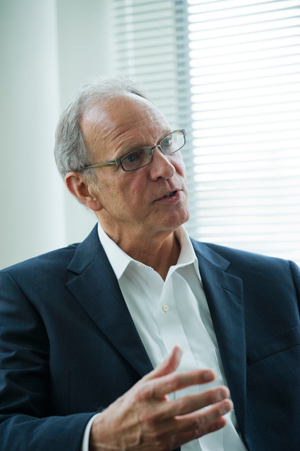MED’s Corley Appointed NEIDL Director
Takes charge at critical moment in research into infectious diseases

Ronald Corley, whose five years as associate director of BU’s National Emerging Infectious Diseases Laboratories (NEIDL) saw the lab overcome several legal and political challenges, has been appointed NEIDL director, effective October 1. Corley will continue as a School of Medicine professor and chair of microbiology, but will no longer be Medical Campus associate provost for research.
Announcing Corley’s appointment in a message to the Boston University community, President Robert A. Brown describes the new director as “an outstanding scientist and a collaborative leader.”
Corley succeeds John R. Murphy, a MED professor of medicine and microbiology, who had been NEIDL interim director since 2011. Brown says he is grateful to Murphy, “who has been instrumental in bringing the laboratories through the arduous regulatory processes and the initial launch of operations.”
“Dr. Corley’s leadership and vision will allow the NEIDL to reach its potential of being one of the premier centers for research on emerging and deadly infectious diseases,” says Gloria S. Waters, vice president and associate provost for research. “His experience as the associate director over the past five years will ensure a smooth transition and has shown that he has the collaborative style necessary to run a center like this and strengthen this area of research excellence at BU.”
Corley takes the helm of NEIDL at a critical time, as the worst Ebola virus outbreak in history continues to sweep across Central Africa.
“With Ebola, you can’t diagnose somebody until they’re already symptomatic,” he says. “Think how beneficial it would be if you had a tool that could diagnose people earlier. That alone would be a game changer. It’s imperative for us to learn to understand these emerging viruses and also to develop the diagnostics, the therapeutics, and the vaccines. That’s what the NEIDL is about.”
Construction of the NEIDL, on the Medical Campus in Boston’s South End, was completed in 2008 at a cost of $200 million, with the majority of the funding—$141 million—provided by the National Institutes of Health. The 192,000-square-foot laboratory is part of a national network of secure facilities dedicated to the development of diagnostics, vaccines, and treatments to combat emerging and reemerging infectious diseases.
The NEIDL has faced opposition from community activists expressing concern over safety and security, worries heightened by recent breaches at the US Centers for Disease Control and Prevention (CDC), where scientists were accidentally exposed to potentially viable anthrax bacteria.
“The recent events at the CDC have done nothing to dampen people’s concerns,” says Corley. “Those were horrible events—they were outrageous. The first thing we do when events like that happen is review all our processes and ask, could that have happened here? And if the answer is no, we make sure everyone understands why. And if we need to change something, we change it.”
Corley says he is committed to open communication with the public regarding the lab’s operations, safety protocols, and research goals.
“One of the things that former director Jack Murphy has been adamant about—and I have absolute, full intention to continue—is to be as open, direct, and transparent with the community as possible,” Corley says. “We want to address any questions that come our way and meet with anyone who wants to meet with us. We will continue our public outreach, because communication with the public is absolutely critical.”
The lab has been approved for some Biosafety Level 3 (BSL-3) research and is currently working to secure the necessary permits and approvals for BSL-4 research from the Boston Public Health Commission and the CDC. Corley’s goal is to begin BSL-4 research in the NEIDL in 2015. He also plans to begin a significant recruitment campaign across a number of different disciplines.
“We already have a small but outstanding group of scientists here,” he says. “What we want to do is build critical mass in certain areas that will raise everybody’s game.”
One of his first tasks will be to identify the top three areas to focus recruiting efforts on. These areas are still under discussion, but zoonosis (the spread of infectious disease between species) and pathogenesis (the mechanism by which microbes cause disease) will certainly be top priorities at NEIDL, he says. Tuberculosis and other respiratory pathogens are also likely areas of focus.
“The advantage of having the NEIDL in an academic, research-intensive institution is that it gives us the ability to address broad questions about infectious diseases,” he says. “That means we are going to be recruiting people from a variety of disciplines: engineers, chemists, biologists, ecologists. Emerging infectious diseases are about humans encroaching on animal territories, and it’s about global warming and changes in habitats. We’re not just doing research on individual pathogens and how they function, but also trying to globally understand where these diseases come from and how we can model, predict, and prevent their spread to humans.”
Corley earned a BS in zoology and a PhD in microbiology and immunology from Duke University. He has been MED’s microbiology chair since 1994, a position he says taught him to work across disciplines and build broad collaborations between the Charles River and Medical Campuses.
“We want to be a premier emerging infectious diseases institute, not only in the United States, but in the world,” he says. “And I think we have the potential for doing exactly that.”
This BU Today article was written by Barbara Moran